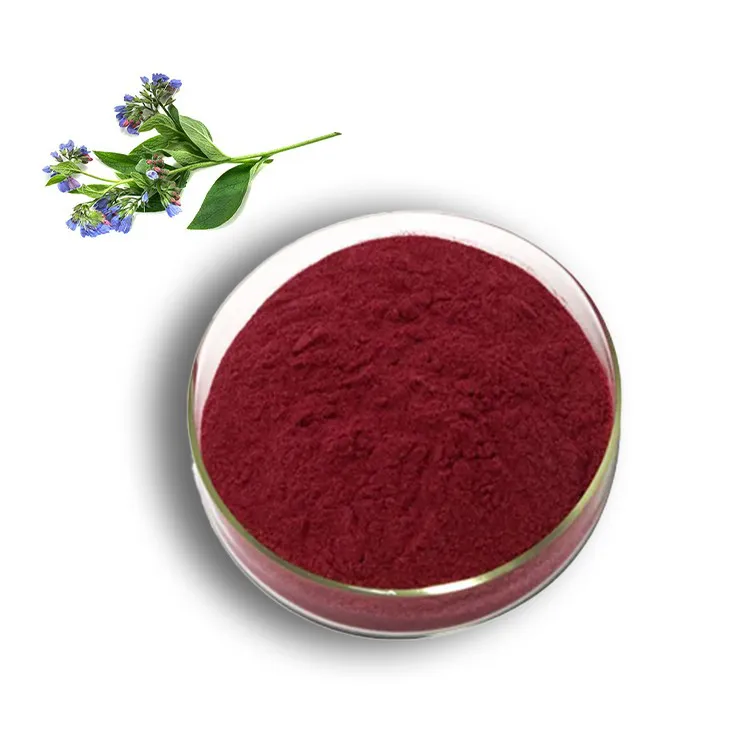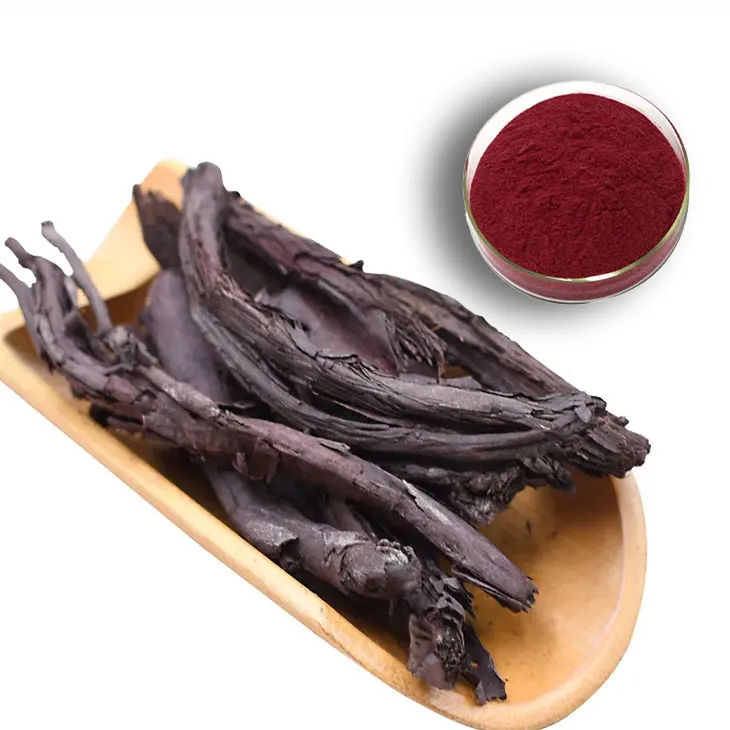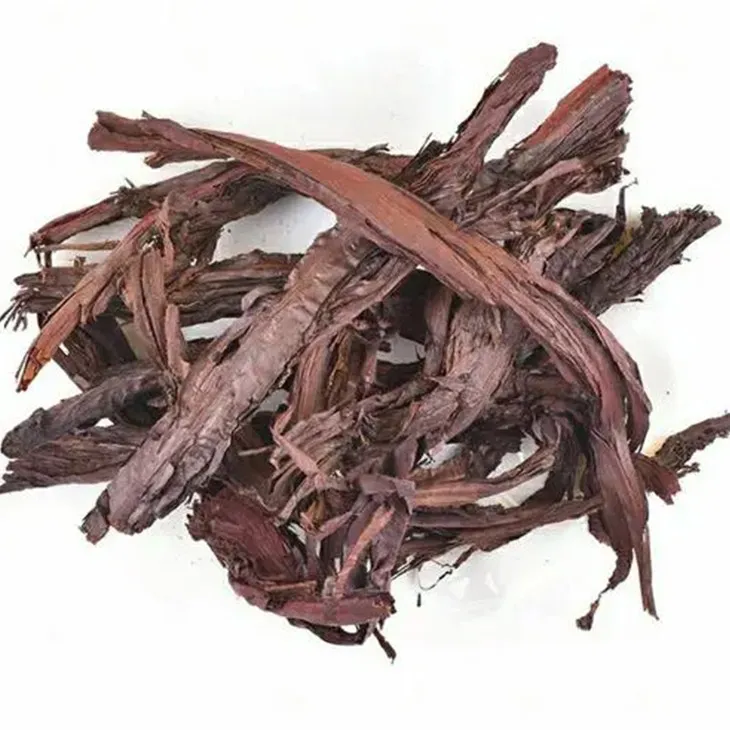- 0086-571-85302990
- sales@greenskybio.com
Ten Amazing Health Benefits of Shikonin.
2024-11-12

1. Introduction to Shikonin
Shikonin is a natural compound that has been increasingly studied in recent years. It is derived from the roots of plants in the Boraginaceae family, particularly the Lithospermum erythrorhizon. This compound has a long history of use in traditional medicine in some Asian countries. With the development of modern scientific research techniques, its various health - promoting properties are being gradually uncovered.

2. Immunomodulatory Effects
Enhancing Immune Cell Function: Shikonin exhibits immunomodulatory effects, which play a crucial role in maintaining the body's health. It can enhance the function of immune cells such as macrophages, lymphocytes, and dendritic cells. Macrophages, for example, are important components of the innate immune system. Shikonin can stimulate macrophages to increase their phagocytic activity, allowing them to better engulf and destroy foreign pathogens such as bacteria and viruses.
Regulating the Immune Response: In addition to enhancing the function of immune cells, shikonin can also regulate the overall immune response. In some cases, the immune system may overreact, leading to autoimmune diseases. Shikonin has the potential to balance the immune response, preventing excessive immune reactions while still maintaining the ability to fight off infections. This is achieved through its influence on cytokine production. Cytokines are small proteins that play important roles in cell - to - cell communication in the immune system. Shikonin can modulate the production of cytokines such as interleukin - 10 (IL - 10) and interferon - gamma (IFN - γ), which are involved in regulating immune responses.

3. Nervous System Protection
Neuroprotective Mechanisms: Shikonin has the potential to protect the nervous system, which is of great significance for preventing neurodegenerative diseases. One of the main neuroprotective mechanisms of shikonin is its antioxidant activity. The nervous system is highly vulnerable to oxidative stress due to its high metabolic rate and relatively low antioxidant defense mechanisms. Oxidative stress can cause damage to neurons, leading to neurodegeneration. Shikonin can scavenge free radicals, reducing oxidative stress and protecting neurons from damage.
Anti - Inflammatory Effects in the Nervous System: Inflammation in the nervous system is also a key factor contributing to neurodegenerative diseases. Shikonin has anti - inflammatory properties that can reduce neuroinflammation. It can inhibit the activation of microglia, which are the resident immune cells in the central nervous system. When activated, microglia can release pro - inflammatory cytokines, which can cause damage to neurons. By inhibiting microglia activation, shikonin can reduce neuroinflammation and protect the nervous system.

4. Anti - Allergic Properties
Relieving Allergic Symptoms: Shikonin's anti - allergic properties can relieve allergic symptoms, providing relief for those suffering from allergies. Allergic reactions occur when the immune system overreacts to harmless substances such as pollen, dust mites, or certain foods. During an allergic reaction, the body releases histamine, which causes symptoms such as itching, sneezing, and swelling. Shikonin can inhibit the release of histamine from mast cells, which are the cells responsible for storing and releasing histamine during an allergic reaction. By reducing histamine release, shikonin can effectively relieve allergic symptoms.
Modulating the Allergic Immune Response: In addition to relieving allergic symptoms, shikonin can also modulate the allergic immune response. It can influence the differentiation and function of T helper cells, which play important roles in the allergic immune response. There are two main types of T helper cells involved in allergies: Th1 and Th2 cells. An imbalance between Th1 and Th2 cells can lead to allergic diseases. Shikonin can help restore the balance between Th1 and Th2 cells, thereby modulating the allergic immune response.
5. Anti - Cancer Potential
Inducing Cancer Cell Apoptosis: Shikonin has shown potential in the fight against cancer. One of the main anti - cancer mechanisms of shikonin is its ability to induce cancer cell apoptosis. Apoptosis is a programmed cell death process that is crucial for maintaining normal cell homeostasis. In cancer cells, the apoptotic process is often disrupted, leading to uncontrolled cell growth and proliferation. Shikonin can activate various apoptotic pathways in cancer cells, such as the mitochondrial - mediated apoptotic pathway and the death receptor - mediated apoptotic pathway, causing cancer cells to undergo apoptosis.
Anti - Angiogenesis Effects: Another important anti - cancer mechanism of shikonin is its anti - angiogenesis effects. Angiogenesis is the process by which new blood vessels are formed. Cancer cells need a continuous supply of nutrients and oxygen to grow and metastasize, and they can stimulate the formation of new blood vessels through the secretion of angiogenic factors. Shikonin can inhibit angiogenesis by targeting angiogenic factors or their receptors, thereby cutting off the blood supply to cancer cells and inhibiting their growth and metastasis.
6. Cardiovascular Health Benefits
Reducing Blood Pressure: Shikonin may have beneficial effects on cardiovascular health. One of the potential benefits is its ability to reduce blood pressure. High blood pressure is a major risk factor for cardiovascular diseases such as heart attacks and strokes. Shikonin can act on the cardiovascular system in several ways to lower blood pressure. For example, it can relax blood vessels, reducing vascular resistance. This is achieved through its influence on the endothelial cells that line the blood vessels. Shikonin can stimulate the release of nitric oxide from endothelial cells, which is a vasodilator that can widen blood vessels and lower blood pressure.
Anti - Atherosclerotic Effects: Shikonin also has anti - atherosclerotic effects. Atherosclerosis is a chronic inflammatory disease of the arteries, characterized by the formation of plaques on the arterial walls. These plaques can narrow the arteries and increase the risk of cardiovascular events. Shikonin can inhibit the formation of atherosclerotic plaques by reducing inflammation in the arteries, inhibiting the uptake of low - density lipoprotein (LDL) cholesterol by macrophages, and promoting the regression of existing plaques.
7. Anti - Inflammatory Properties
General Anti - Inflammatory Mechanisms: Shikonin has broad - spectrum anti - inflammatory properties. Inflammation is a complex biological process that is involved in many diseases, including autoimmune diseases, chronic inflammatory diseases, and infections. Shikonin can inhibit the production of pro - inflammatory cytokines such as tumor necrosis factor - alpha (TNF - α), interleukin - 1β (IL - 1β), and interleukin - 6 (IL - 6). These cytokines play important roles in the initiation and amplification of the inflammatory response. By reducing their production, shikonin can effectively suppress inflammation.
Anti - Inflammatory Effects in Different Tissues: Shikonin can exert its anti - inflammatory effects in different tissues. For example, in the skin, it can be used to treat inflammatory skin diseases such as eczema and psoriasis. In the joints, it may have potential for treating rheumatoid arthritis by reducing joint inflammation. In the gastrointestinal tract, it can relieve inflammation caused by inflammatory bowel diseases such as Crohn's disease and ulcerative colitis.
8. Antioxidant Activity
Free Radical Scavenging: Shikonin has strong antioxidant activity, which is mainly due to its ability to scavenge free radicals. Free radicals are highly reactive molecules that can cause oxidative damage to cells. They are produced during normal cellular metabolism as well as in response to environmental factors such as pollution, radiation, and smoking. Shikonin can donate electrons to free radicals, neutralizing them and preventing them from causing damage to cellular components such as DNA, proteins, and lipids.
Enhancing the Body's Antioxidant Defense System: In addition to scavenging free radicals directly, shikonin can also enhance the body's antioxidant defense system. It can up - regulate the expression of antioxidant enzymes such as superoxide dismutase (SOD), catalase (CAT), and glutathione peroxidase (GPx). These antioxidant enzymes play important roles in the body's defense against oxidative stress by catalyzing the breakdown of reactive oxygen species. By enhancing the expression of these enzymes, shikonin can improve the body's overall antioxidant capacity.
9. Wound Healing Promotion
Stimulating Cell Proliferation: Shikonin has the potential to promote wound healing. One of the mechanisms involved is its ability to stimulate cell proliferation. In the process of wound healing, various cells such as fibroblasts, keratinocytes, and endothelial cells need to proliferate to close the wound. Shikonin can stimulate the proliferation of these cells, accelerating the process of wound closure.
Enhancing Collagen Synthesis: Another important aspect of wound healing is collagen synthesis. Collagen is the main structural protein in the extracellular matrix and is essential for wound strength and integrity. Shikonin can enhance collagen synthesis by fibroblasts, which helps to improve the quality of the healed wound.
10. Anti - Diabetic Effects
Regulating Blood Glucose Levels: Shikonin may have anti - diabetic effects. It can regulate blood glucose levels, which is crucial for diabetes management. In diabetic patients, blood glucose levels are often abnormally high. Shikonin can act on several targets in the body to lower blood glucose levels. For example, it can improve insulin sensitivity, allowing cells to better respond to insulin and take up glucose from the blood. It can also inhibit the breakdown of glycogen in the liver, reducing the release of glucose into the blood.
Protecting Pancreatic Beta - Cells: In addition to regulating blood glucose levels, shikonin can also protect pancreatic beta - cells. Pancreatic beta - cells are responsible for producing insulin. In diabetes, beta - cells are often damaged, leading to a decrease in insulin production. Shikonin can protect beta - cells from damage caused by factors such as oxidative stress and inflammation, thereby maintaining their function and insulin production.
FAQ:
What is shikonin?
Shikonin is a natural compound that has been found to possess multiple health - beneficial properties. It is of particular interest in the health - science community due to its diverse effects on the body.
How does shikonin enhance the immune system?
Shikonin exhibits immunomodulatory effects, which means it can regulate and improve the function of the immune system. However, the exact mechanisms are still under research. It may interact with immune cells and molecules in the body to stimulate a more effective immune response.
Can shikonin really prevent neurodegenerative diseases?
Shikonin has the potential to protect the nervous system, which is a positive sign for preventing neurodegenerative diseases. While it shows promise, more research is needed to fully understand its effectiveness and the specific ways it may prevent these diseases. It may work by reducing inflammation in the nervous system or protecting nerve cells from damage.
How does shikonin relieve allergic symptoms?
Shikonin has anti - allergic properties. It likely works by interfering with the mechanisms that trigger allergic reactions in the body. This could involve reducing the release of histamine or modulating the immune response that is involved in allergic reactions, thereby providing relief to those with allergies.
Are there any side effects of shikonin?
Currently, more research is needed to comprehensively understand the potential side effects of shikonin. Since it is a natural compound, it may be perceived as relatively safe, but it's possible that in high doses or in certain individuals, there could be adverse effects. For example, it might interact with other medications or cause unexpected reactions in people with specific health conditions.
Related literature
- The Immunomodulatory Effects of Shikonin: A Comprehensive Review"
- "Shikonin and Nervous System Protection: Current Research and Future Prospects"
- "Anti - Allergic Mechanisms of Shikonin: An Update"
- ▶ Hesperidin
- ▶ Citrus Bioflavonoids
- ▶ Plant Extract
- ▶ lycopene
- ▶ Diosmin
- ▶ Grape seed extract
- ▶ Sea buckthorn Juice Powder
- ▶ Fruit Juice Powder
- ▶ Hops Extract
- ▶ Artichoke Extract
- ▶ Mushroom extract
- ▶ Astaxanthin
- ▶ Green Tea Extract
- ▶ Curcumin
- ▶ Horse Chestnut Extract
- ▶ Other Product
- ▶ Boswellia Serrata Extract
- ▶ Resveratrol
- ▶ Marigold Extract
- ▶ Grape Leaf Extract
- ▶ New Product
- ▶ Aminolevulinic acid
- ▶ Cranberry Extract
- ▶ Red Yeast Rice
- ▶ Red Wine Extract
-
Coconut Water Powder
2024-11-12
-
Artichoke Leaf Extract
2024-11-12
-
Stevia Extract
2024-11-12
-
Genistein
2024-11-12
-
Lemon Extract
2024-11-12
-
Beetroot Powder
2024-11-12
-
Green Tea Extract
2024-11-12
-
Withania Somnifera Extract
2024-11-12
-
Rose Hip Extract
2024-11-12
-
American Ginseng Root Extract
2024-11-12





















